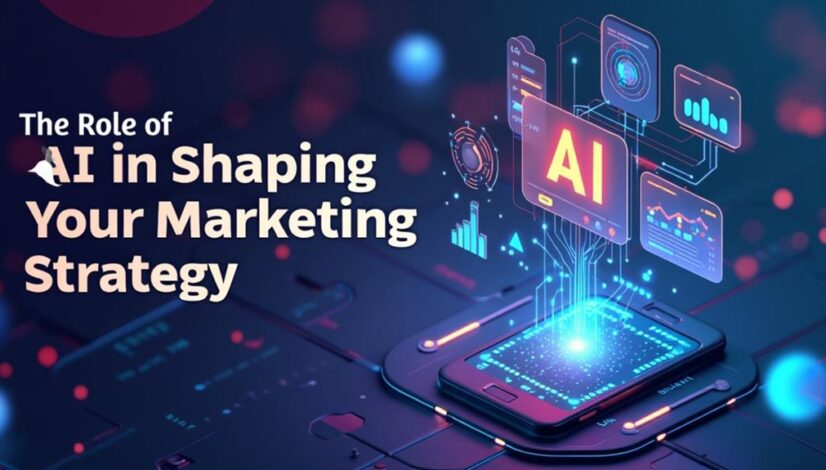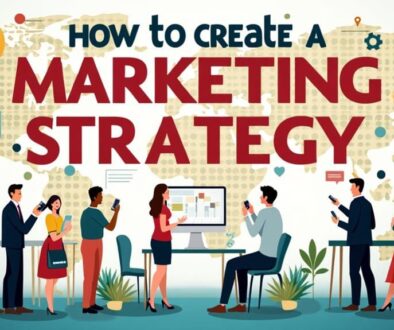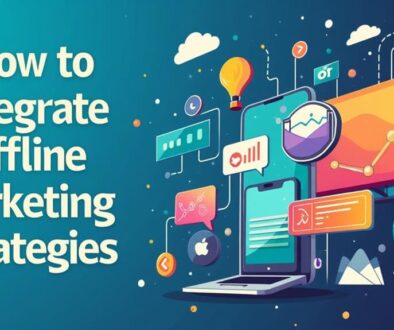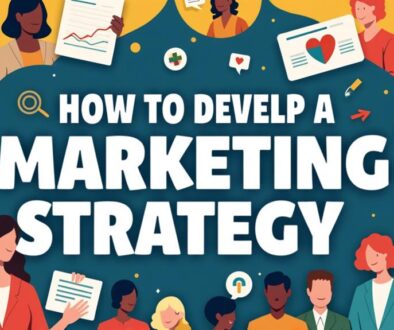The Role of AI in Shaping Your Marketing Strategy
Artificial Intelligence (AI) is transforming marketing strategies by enabling a level of precision and efficiency previously unattainable. Through advanced data analytics, AI uncovers essential consumer insights, facilitating targeted messaging and personalized experiences. Predictive analytics anticipates customer behavior, allowing brands to adapt swiftly and effectively to market changes. Additionally, AI automates repetitive tasks, freeing up resources for creative strategy development. As organizations integrate AI tools, they enhance customer engagement and improve advertising effectiveness. Embracing these technological advancements is imperative for sustainable growth and competitive advantage in an evolving landscape, revealing more dimensions of impact worth exploring.
Key Takeaways
- AI enhances marketing strategies through automation, improving efficiency and allowing for personalized customer engagement.
- Predictive analytics leverage historical data to forecast consumer behavior, aiding targeted messaging and campaign optimization.
- Data-driven insights from AI enable effective audience segmentation, tailoring marketing approaches to specific consumer needs.
- AI-driven content creation streamlines the production of engaging materials while optimizing messaging for better brand resonance.
- Ethical considerations in AI implementation ensure marketing decisions are made fairly, promoting trust with consumers and sustainability in growth.
Understanding AI in Marketing

In the fast-evolving landscape of digital marketing, understanding AI's role is crucial for cultivating successful strategies. Artificial intelligence (AI) tools have revolutionized the way brands engage with consumers, allowing for unprecedented levels of customization and efficiency through marketing automation. By leveraging machine learning algorithms, companies can analyze vast amounts of data to uncover actionable customer insights, which can inform and enhance brand strategy.
The integration of AI technologies leads to digital transformation, fundamentally reshaping how businesses approach consumer engagement. For instance, predictive analytics can anticipate customer behavior, enabling brands to tailor their communications and offers in a way that resonates more deeply with their target audience. This can greatly improve user experience, as consumers receive relevant content that aligns with their interests and needs.
However, the use of AI in marketing also raises important questions surrounding data privacy. Brands must navigate the fine line between personalized marketing and overstepping individual privacy boundaries. Employing transparent practices and communicating data usage clearly to consumers can establish trust and foster loyalty.
Ultimately, technology integration is key for organizations aspiring to remain competitive: AI tools can automate repetitive tasks, streamline operations, and provide valuable insights into consumer trends.
As marketers embrace the power of artificial intelligence, they must strike a balance between innovative strategies and ethical considerations to guarantee sustainable growth in a dynamic market. Emphasizing these principles will enable brands to harness the full potential of AI while fostering lasting relationships with consumers.
Data Analysis and Insights
In the domain of marketing, AI-driven data analysis reveals essential insights that facilitate the identification of key trends within consumer behavior.
By harnessing predictive analytics, organizations can forecast market demands and tailor their strategies accordingly.
Moreover, effective audience segmentation empowers businesses to engage with distinct customer profiles, enhancing personalization and driving conversion rates.
Identifying Key Trends
The landscape of marketing is undergoing rapid transformation, driven largely by advancements in artificial intelligence and data analytics. Identifying key trends has become essential for businesses seeking to refine their innovation strategies and enhance brand positioning amid fierce competition.
Leveraging behavioral analytics allows marketers to gain deeper consumer insights, facilitating market segmentation that aligns with evolving needs. Trend forecasting empowers organizations to anticipate shifts in consumer preferences, ensuring that they remain agile during digital transformation processes.
Technology adoption plays a vital role in this evolution, enabling companies to harness data-driven strategies that optimize the customer journey. Through competitive analysis, brands can identify gaps and opportunities in the market, allowing for targeted engagement and personalized experiences designed to resonate with distinct consumer segments.
Incorporating these elements into a thorough marketing strategy not only enhances responsiveness but also fosters sustainable growth. As businesses navigate this intricate landscape, an emphasis on data analytics will illuminate pathways toward customer-centric approaches that are essential for thriving in the modern marketplace.
Ultimately, understanding and capitalizing on key trends will empower brands to break free from traditional constraints and embrace a future filled with possibility.
Predictive Analytics Applications
Harnessing the power of predictive analytics allows marketers to anticipate future consumer behaviors and preferences based on historical data patterns. Through predictive modeling, marketers can identify customer segments that exhibit similar characteristics, enabling targeted messaging tailored to their unique needs. This approach enhances marketing optimization by focusing resources on the highest-value audiences.
Trend forecasting is a crucial application of predictive analytics, as it helps organizations stay ahead in a fast-changing market landscape. By leveraging data-driven decisions, businesses can improve sales forecasting accuracy and reduce risk evaluation uncertainties, thereby empowering them to allocate budgets more effectively.
Performance tracking further allows marketers to analyze engagement metrics, evaluating the impact of various strategies on conversion rates.
Moreover, utilizing conversion analysis helps clarify which channels and tactics yield the best results. By continually refining their approach based on insights garnered from predictive analytics, marketers can improve overall effectiveness, fostering sustainable customer relationships.
In a world where understanding customer intent is paramount, integrating predictive analytics into your marketing strategy transcends mere data interpretation, starting a journey towards insightful, proactive marketing.
Segmenting Target Audiences
Segmenting target audiences is a fundamental aspect of developing an effective marketing strategy, as it involves analyzing data to uncover distinct consumer groups within a broader market. By leveraging audience demographics, businesses can identify age, gender, and income levels, while behavioral segmentation reveals patterns in consumer interactions, aiding in tailoring campaigns to specific preferences.
Moreover, psychographic insights explore consumer values and lifestyles, enabling the creation of detailed customer personas that resonate deeply with niche markets. Geographic targeting further refines this approach, allowing marketers to craft localized strategies that cater to regional preferences.
Data-driven segmentation enhances decision-making by harnessing robust market research methodologies, ensuring that engagement metrics reflect genuine consumer behavior. Effective segmentation strategies not only improve the relevance of marketing initiatives but also drive significant ROI by connecting brands with their most receptive audiences.
In embracing AI tools, marketers can automate and optimize these segmentation processes, ensuring agility and responsiveness in dynamic consumer landscapes. By understanding each segment's unique attributes, brands can foster a sense of freedom for consumers, allowing authenticity to shine through personalized marketing efforts in an ever-evolving marketplace.
Predicting Consumer Behavior

In the realm of marketing, accurately predicting consumer behavior has become a pivotal element for businesses seeking to gain a competitive advantage. By harnessing insights from behavioral economics and consumer psychology, organizations can better understand the complex purchasing patterns that drive market dynamics.
Predictive modeling serves as a powerful tool in this scenario, allowing marketers to analyze historical data and identify correlations between social influences and consumer decisions.
Through trend forecasting, brands can anticipate shifts in consumer preferences and adjust their strategies accordingly. By leveraging engagement metrics, marketers are equipped to evaluate the effectiveness of their messaging, pinpoint emotional triggers that resonate with their audience, and refine their approaches to market segmentation.
This data-driven decision-making process is essential for businesses aiming to tailor their offerings to distinct consumer segments, ensuring that each message is as relevant and impactful as possible.
Moreover, the integration of AI into these processes enables marketers to process vast amounts of data rapidly, uncovering insights that human analysis may overlook. As organizations become increasingly reliant on predictive analytics, they not only bolster their understanding of current consumer behavior but also preempt future trends that could influence market landscapes.
Ultimately, predicting consumer behavior empowers marketers to create more focused strategies, aligning their efforts with the nuanced motivations of their audience, and fostering deeper brand loyalty in an ever-evolving marketplace.
This mastery of consumer insights is no longer a luxury but a necessity for sustained success.
Personalization Strategies
Tailoring marketing efforts to individual preferences has emerged as a cornerstone of effective personalization strategies. In a time when consumers are bombarded with information, the ability to deliver relevant content is essential.
Dynamic messaging—adapting communications based on customer behavior and preferences—plays a pivotal role in this endeavor. This approach allows brands to engage customers at multiple touchpoints throughout their customer journey, ensuring that each interaction resonates on a personal level.
By leveraging advanced analytics and AI capabilities, marketers can examine vast datasets to identify patterns and preferences that inform their personalization strategies. For instance, predictive analytics can segment audiences not only by demographic characteristics but also by behaviors and attitudes, facilitating targeted messaging that feels unique to each individual.
Such an approach not only enhances customer experience but also builds brand loyalty, as consumers perceive brands as being in tune with their needs.
Moreover, dynamic messaging can transform product recommendations, promotional offers, and content delivery into a seamless part of the customer journey. By utilizing algorithms that learn and adapt over time, brands can adjust their messaging in real-time, enhancing engagement and driving conversion rates.
Automating Marketing Processes

Through the lens of efficiency and precision, automating marketing processes has become a transformative necessity in the digital landscape. The integration of AI tools into marketing strategies has redefined how businesses approach campaign management, greatly enhancing marketing efficiency. By leveraging advanced algorithms, organizations can streamline workflows, minimizing manual labor and allowing teams to focus on strategic initiatives.
Process streamlining through workflow automation not only accelerates lead generation but also optimizes customer journeys. AI tools can analyze vast amounts of data to predict consumer behaviors and preferences, tailoring marketing efforts to individual needs. This level of personalization drives engagement and fosters loyalty, while simultaneously improving resource allocation across various marketing channels.
Time savings emerge as a pivotal benefit of this automation, as repetitive tasks—such as email marketing, social media posting, and ad placements—can be executed efficiently through programmed AI responses. With the capability to execute multiple campaigns simultaneously, brands are empowered to react swiftly to market changes, ensuring that they remain relevant amid shifting consumer demands.
Furthermore, digital integration allows for thorough tracking of campaign performance, providing invaluable insights into consumer interactions and conversions. This data-driven approach facilitates informed decision-making and enhances strategic planning.
Ultimately, automating marketing processes not just elevates productivity; it opens new avenues for creativity and innovation, freeing teams to pursue more holistic and visionary marketing strategies.
AI-Driven Content Creation
As marketing strategies evolve, the role of AI-driven content creation has emerged as a pivotal element in developing compelling narratives that resonate with target audiences. The utilization of AI tools facilitates a transformation in how brands approach content creation and optimization, empowering marketers to harness data-driven insights for enhanced audience engagement.
The process of AI-driven content creation can be segmented into four core components:
- Creative Automation: AI streamlines the content creation process, allowing marketers to generate articles, blogs, and social media posts quickly and efficiently.
- SEO Enhancement: AI tools assist in optimizing content for search engines, ensuring higher visibility and improved rankings, effectively connecting brands with their intended audiences.
- Visual Content Generation: AI technologies enable the creation of visually appealing graphics and videos, which markedly enhance brand storytelling, making content more engaging and shareable across various platforms.
- Copy Refinement and Narrative Generation: By analyzing audience preferences and behaviors, AI can suggest adjustments to messaging, ensuring that the narrative aligns seamlessly with brand values and resonates with core demographics.
In a world increasingly driven by data, the integration of AI in content strategies is not just an advantage; it is a necessity. By leveraging these advanced technologies, brands can fine-tune their offerings and amplify their reach, nurturing a deeper connection with their audience through personalized and impactful storytelling.
Through thoughtful social media integration, compelling narratives are crafted, ensuring that every piece of content nurtures the relationship between the brand and its audience.
Enhancing Customer Engagement

In today's competitive marketplace, brands must prioritize customer engagement as a cornerstone of their marketing strategy. Enhancing customer engagement involves employing data-driven techniques to foster an emotional connection between the brand and its audience. By analyzing customer feedback and engagement metrics, organizations can identify key areas for improvement and tailor their strategies accordingly.
Utilizing interactive content, such as polls or quizzes, can greatly increase social media engagement, drawing users into the brand narrative. Additionally, loyalty programs that implement gamification strategies can incentivize repeat interactions, driving sustained engagement. These elements not only reward customers but also facilitate community building, leading to a more dedicated consumer base.
User-generated content (UGC) serves as a powerful tool in enhancing customer engagement. By encouraging customers to share their experiences, brands can leverage authentic voices that resonantly connect with potential buyers. Real-time responses to customer inquiries or comments on social media further enrich this interaction, demonstrating that brands value their customers' opinions and foster a two-way dialogue.
In an era of information overload, brands that master the art of crafting meaningful connections through these engagement techniques stand out. By measuring engagement metrics, businesses can continuously evolve their approaches, ensuring they meet consumer needs and desires effectively.
Ultimately, enhancing customer engagement is not merely about marketing tactics—it's about creating genuine, lasting relationships that empower customers within the brand universe.
Optimizing Advertising Campaigns
Building on the foundation of enhanced customer engagement, improving advertising campaigns serves as a strategic imperative for maximizing marketing effectiveness. To harness the power of artificial intelligence in this domain, marketers must implement a data-driven approach that revolves around key components which can greatly elevate ad performance and return on investment (ROI).
- Audience Targeting: Leverage AI algorithms to analyze customer behavior, enabling precise segmentation and targeting of niche audiences, thereby enhancing campaign relevance.
- Ad Creatives: Use AI-generated insights to design compelling ad creatives that resonate with the identified audience segments, boosting engagement rates.
- A/B Testing: Utilize automated A/B testing tools to experiment with various ad formats and messaging, allowing for rapid iteration and enhancement based on real-time performance data.
- Budget Allocation: Implement AI-driven budget allocation strategies that dynamically adjust funding in response to campaign performance, maximizing ROI through intelligent utilization of resources.
Effective campaign optimization also requires meticulous attention to conversion tracking and ad scheduling. By continuously monitoring key performance metrics, marketers can refine their platform selection to deliver ads at ideal times and places.
The integration of these strategies fosters an ecosystem where agility and data transparency prevail, ultimately leading to more successful marketing efforts. Embracing AI not only allows for increased efficiency but also provides marketers with the freedom to explore innovative ways to connect with their audience, ensuring campaigns remain not just effective, but transformative.
Ethical Considerations in AI

The ethical implications of AI in marketing strategy encompass a complex landscape that demands careful navigation amidst the pursuit of innovation and consumer engagement. Central to this discourse is the necessity for bias mitigation, as flawed algorithms can propagate existing prejudices, adversely affecting subsets of consumers.
Implementing robust transparency measures is essential in cultivating algorithm fairness, allowing stakeholders to understand how data informs marketing decisions. In this context, accountability frameworks become critical, ensuring that organizations not only develop responsible AI systems but also take responsibility for their outcomes.
Ethical frameworks should guide companies in prioritizing consumer privacy, aligning marketing practices with data ethics to foster a sense of trust among consumers. By demonstrating commitment to data protection, brands can engage in trust building, fundamental in a time when consumers demand greater control over their personal information.
Moreover, stakeholder engagement plays a pivotal role in shaping ethical AI strategies. Involving diverse voices in discussions surrounding AI can lead to more holistic solutions, addressing concerns while promoting inclusivity.
Companies must endeavor for responsible AI deployment, recognizing that ethical considerations will increasingly influence consumer decisions.
Future Trends in AI Marketing
Anticipating the innovative landscape of marketing, future trends in AI are poised to reshape consumer engagement and business strategies greatly. As organizations embrace advancements in technology, they will leverage AI to enhance customer interactions across multiple touchpoints. The integration of sophisticated capabilities will facilitate a more personalized customer journey.
Key trends to watch include:
- Voice Search: The rise of smart speakers has shifted how consumers seek information, emphasizing the importance of optimized content for voice interaction.
- Visual Recognition: This technology will empower brands to analyze images and videos, enhancing targeted advertising based on visual preferences.
- Chatbot Technology: Intelligent chatbots will continue to evolve, offering real-time support and tailored recommendations, greatly improving customer service efficiency.
- Sentiment Analysis: By understanding consumer emotions through social listening, brands will refine their messaging to resonate deeper with their audience.
Moreover, augmented reality (AR) and recommendation engines will play a pivotal role in modifying the shopping experience, allowing consumers to envision products in their environment.
Integrated platforms that harmonize various AI tools will enable marketers to execute dynamic localization strategies that cater to diverse markets.
As businesses increasingly adopt these technologies, the synergy of AI-driven insights and creative strategies will yield greater freedom in maneuvering complex consumer expectations, ultimately fostering stronger brand loyalty.
Frequently Asked Questions
How Can Small Businesses Implement AI in Their Marketing Strategy?
Small businesses can effectively implement AI in their marketing strategies by leveraging tools for customer personalization and content creation.
AI-powered analytics enable businesses to gather and analyze customer data, facilitating tailored marketing efforts that resonate with individual preferences.
Additionally, automated content generation tools can streamline the production of relevant marketing materials, thereby enhancing both efficiency and engagement.
What Are the Costs Associated With Integrating AI Into Marketing?
AI integration costs can vary greatly based on the technology selected, implementation complexity, and ongoing maintenance requirements.
Small businesses should consider budget allocation strategies that prioritize essential AI tools, such as customer analytics or automated marketing software, while avoiding overspending on underutilized features.
Evaluating the potential return on investment (ROI) is critical; effective budgeting can empower businesses, allowing them to harness AI capabilities while maintaining financial flexibility in an increasingly competitive landscape.
How Do I Choose the Right AI Tools for My Business?
Steering through the vast ocean of AI tools can mirror the quest for the Holy Grail; the journey is fraught with choices.
Begin with a thorough assessment of your business needs, identifying specific objectives and challenges that require targeted solutions.
Evaluate tools based on scalability, ease of integration, and their ability to provide data-driven insights.
Additionally, consider user reviews and case studies to guarantee that your AI tool selection aligns seamlessly with your organizational goals.
Can AI Replace Human Marketers Completely?
While AI considerably enhances marketing automation and efficiency, it cannot wholly replace human marketers.
AI limitations in understanding emotional nuances and human creativity highlight the necessity of human insight in campaigns. Ethical considerations and building consumer trust further emphasize the role of human marketers in steering complex social landscapes.
Instead, the ideal approach lies in leveraging the collaboration potential between AI tools and human expertise to foster innovative, impactful marketing strategies that resonate with audiences.
What Skills Are Needed to Manage AI in Marketing Effectively?
With 73% of marketers believing that effective data analysis is vital for success, it is evident that specific skills are necessary to manage AI in marketing effectively.
Proficiency in data analysis allows professionals to interpret vast amounts of information, while a solid understanding of machine learning enables the optimization of campaigns through predictive analytics.
Additionally, creative problem-solving and strategic thinking are essential to harness AI's full potential, ensuring marketing initiatives remain innovative and free-spirited.
Conclusion
In a landscape dominated by artificial intelligence, the irony lies in the fact that human intuition still holds unparalleled value. While algorithms can predict consumer behavior and automate processes, the true art of marketing flourishes in understanding the subtleties of human emotion. As AI continues to shape strategies, a balance between machine efficiency and human insight will determine success, illustrating that the future of marketing may well depend on embracing what cannot be quantified.




